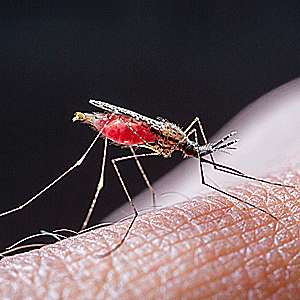
London - Malaria deaths have dropped dramatically since 2000 and cases are falling steadily thanks to more people being diagnosed and treated and more getting bed nets, the World Health Organisation (WHO) said on Tuesday.
Yet progress against the mosquito-borne infection remains fragile and West African countries suffering an unprecedented epidemic of Ebola are particularly at risk of seeing a resurgence of malaria, the United Nations health agency said.
In its annual report on the disease, the World malaria report 2014, the WHO said the malaria death rate fell by 47 percent worldwide between 2000 and 2013 and by 54 percent in Africa, where about 90 percent of all malaria deaths occur.
Symptoms of malaria include chills, sweats, feelings of weakness, lethargy and dizziness, muscular, body and abdominal pains, headaches, nausea and diarrhoea.
Read: Malaria deaths in South Africa climb
South Africa, which is identified as one of the low-transmission southern African countries in the report, has recorded a total of 1349 deaths since 2000. In that year, 424 people died of the disease compared to 105 last year. However, what is interesting to note is that in 2012, just one death was reported.
In an analysis of malaria's impact across sub-Saharan Africa, it also found that despite a 43 percent increase in population, fewer people in the region are infected every year.
"The next few years are going to be critical to show that we can maintain momentum and build on the gains," said Pedro Alonso, director of the WHO's global malaria programme.
Read: Malaria: things you should know
In West Africa, the report said, the deadly Ebola outbreak has had a "devastating impact" on malaria treatment and the roll-out of malaria control programmes.
In Guinea, Sierra Leone and Liberia - all severely hit by the Ebola epidemic - many inpatient clinics are closed and attendance at outpatient facilities is a fraction of rates seen before the outbreak, it said.
Temporary measures
With a major malaria threat in these countries, which together saw some 6.6 million cases and 20 000 malaria deaths in 2013, the WHO called for temporary control measures, including giving malaria drugs to all patients with fever and carrying out mass treatment in areas hard hit by both Ebola and malaria.
"International donor financing is being stepped up to meet the further recommendation that bed nets be distributed to all (Ebola) affected areas," the report said.
Worldwide, malaria killed some 584 000 people in 2013, including some 453 000 children under five years old. Although funding to fight malaria has increased threefold since 2005, it is still only around half the $5.1 billion needed.
Read: How malaria is treated
WHO director general Margaret Chan said in a statement the data showed the fight against malaria could be won because "we have the right tools and our defences are working".
"But we still need to get those tools to a lot more people if we are to make these gains sustainable."
The reported noted that while an increasing number of countries are moving towards malaria elimination, millions of people continue to lack access to diagnostic testing and treatment.
However, Dr Pedro L Alonso, director of WHO’s Global Malaria Programme, believes that with sufficient funding and commitment huge strides forward can still be made.
“There are biological and technical challenges, but we are working with partners to be proactive in developing the right responses to these. There is a strong pipeline of innovative new products that will soon transform malaria control and elimination. We can go a lot further,” he said.
Also read:
Why mozzies love you and how to repel them
New test fast-tracks malaria diagnosis
Global warming could push malaria to higher areas
Check out Health24's Malaria Centre
Watch this BBC documentary to find our more about the killer disease:




 Publications
Publications
 Partners
Partners















